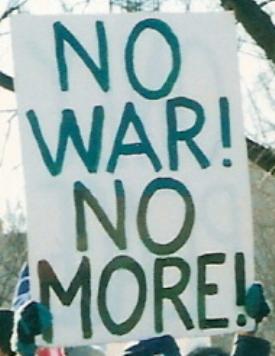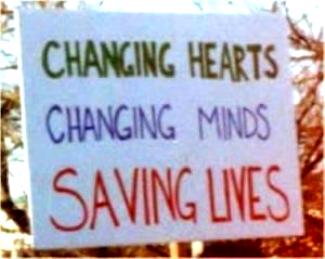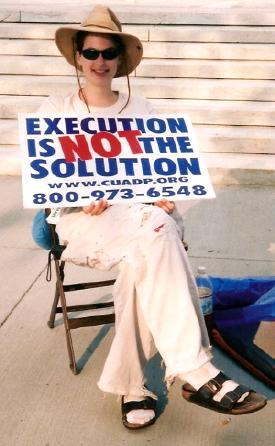
Defend Life and Peace
We need a president who will be brave and consistent in defending our
lives. All of our lives: Born and unborn. Young, old, and in-between.
Healthy, sick, and disabled. The free and those in prison. The men and women of
our military--and citizens of other nations--who suffer deeply when we wage war.
The Need for Consistency and Honor
With the exception of former Rep. Ron Paul (R-Tex.), our recent
presidential candidates and presidents have not been consistent in defending
human life. Indeed, some have been far more involved in taking lives than
in defending them. Most have been hawkish on foreign policy, supporting our recent
wars or even calling for more war. Many have been hawkish on abortion, too,
rejecting even small efforts to restrict it. Most have supported the death penalty.
Both at the presidential level and below it, some politicians claim that
they are "personally opposed" to abortion or doubtful about the death penalty, yet still
vote to support those practices. Some claim that they "hate war," yet vote consistently to
support it.
Politicians--and the rest of us--should not try to have it both ways. Especially on matters
of life and death, our personal and our political positions should be the same. We should live
out in our lives the many-splendored words of "honor" and "integrity." We should
speak out for those whose lives are endangered--especially those who cannot defend themselves.

Why the President Must Defend Life
Our Declaration of Independence says that "life, liberty, and the
pursuit of happiness" are unalienable rights. It makes sense that life is
first on the list, because taking someone's life destroys all of their
rights. Congress long ago recognized the Declaration as part of the
"organic law" of the United States. The Declaration is the first document
in the U.S. Code, the official collection of federal laws.
The Fifth and Fourteenth Amendments to the U.S. Constitution provide
that no person may "be deprived of life, liberty, or property without due
process of law." And the Constitution assigns the power to declare war to
Congress--not the president. It says that treaties we make with other
nations are part of the "supreme Law of the Land." This is a key point,
because treaties such as the Geneva Conventions require protection of both
civilians and military prisoners in wartime.
All of this means that the president, who swears an oath to "preserve,
protect and defend the Constitution of the United States," has major obligations
to protect human life. Sometimes the president can defend life and the
Constitution by challenging the government's judicial branch. One example is
urging the Supreme Court to overturn a previous Court decision when the president
is convinced the decision was wrong.
The Supreme Court has interpreted "due process of law" with
increasing strictness in death-penalty cases, thus giving some protection to
death-row prisoners. Yet in Roe v. Wade, it stripped unborn human beings
of the right to life--essentially by suggesting they are non-persons, or else partly
persons and partly non-persons.
Roe is based on many errors of both fact and legal interpretation. It has
major mistakes about both English common law and American law. Roe
should be at the top of the list for review and overturn.

No More Regime Change
and No More Torture
The president can protect life in our foreign policy by:
✓ Rejecting any effort to overthrow the government of
another country or intervene in its civil war
Many Americans don't realize that our problems with Iran date back to 1953, when a coup
organized by our Central Intelligence Agency overthrew an Iranian prime minister. The U.S.
then supported the repressive regime of the Shah of Iran for many years. Another example: The
CIA's 1961 Bay of Pigs invasion and its plots to assassinate Fidel Castro poisoned our relations
with Cuba for over 50 years.
The CIA overthrew--or helped overthrow--leaders of Brazil, Chile, the Dominican Republic,
Guatemala, and South Vietnam. It made failed attempts to overthrow governments elsewhere.
Presidents have used the CIA to topple other nations' governments when they didn't want to admit
what they were doing. Although many Americans are only dimly aware of U.S. overthrow efforts, citizens
of target countries know about them and deeply resent them.
Presidents have seen coups as quick and relatively cheap ways to solve foreign-policy
problems. Actually, though, each new president inherits problems--sometimes huge ones--that trace back
to the supposedly quick-and-easy overthrows.
After the end of the long Cold War with the Soviet Union, emboldened U.S. leaders turned more
toward open efforts to overthrow rulers of other nations. They now use economic sanctions,
war, and bombing raids to achieve "regime change."
We Americans have always taken pride in our self-government. How, then, can we deny other nations
the right to their own governments? What gives us the right to toss their leaders in or out of
power? Or to bomb their countries at will?

✓ Emphasizing that, unless we are in a just and declared war with another nation, overthrows "will not happen on my watch." Besides keeping that promise, the president must press Congress
to write into law an explicit and permanent ban on overthrows. The CIA must give up its war-making and focus only on its original mission: providing first-rate intelligence to government leaders. That is a major job all by itself, and a crucial one.
Also needed is repeal of the 1973 War Powers Resolution. That law gives presidents power to start wars--a power that the Constitution gives to Congress alone. We must end presidential wars.
✓ Making it clear that the United States strongly opposes torture and
will not use it again
The use of torture against terrorism suspects after 9/11 was, as Sen. John McCain has said, a "stain on our national honor." It was also a violation of our Constitution, federal law, and treaties we have ratified. The president must ensure that all key personnel, both civilian and military, understand that any involvement with torture will result in criminal charges.
The "Obey the Constitution" page offers more ideas about preventing torture
and presidential wars.
Use Diplomacy in a Constructive Way
Instead of starting more wars, the U.S. should focus on ways to prevent them.
The president can pursue this course by:
✓ Offering the assistance of U.S. diplomats in
negotiating cease-fires and peace settlements in disputes where the U.S. is not
involved and thus can be an "honest broker"--and encouraging other nations to do
the same
President Theodore Roosevelt negotiated an end to a war between
Russia and Japan, and President Jimmy Carter achieved a peace agreement
between Egypt and Israel. A president need not be the actual mediator, but
can have the Secretary of State assign first-rate U.S. diplomats to help
where they are wanted. The president should suggest that other heads of state
make their best diplomats available in the same way.
The Chinese-Japanese dispute over ownership of islands in the East China Sea
is a case in point. Expert mediators might help the two nations reach a settlement
that both can live with--perhaps a split of the territory. But if there is no settlement
and the dispute festers, it might lead to a war. That war could involve the United States,
which has a mutual defense treaty with Japan.
✓ Working with other nations to negotiate an end to the nuclear
weapons that threaten every nation and every person on earth
While there has been success in placing some limits on nuclear weapons,
a huge number still exist and are ready to be launched on command. All
nuclear nations should be able to reach agreement to phase them out by using
the "trust but verify" principle that has worked in U.S.-Russian nuclear
agreements. The United States should take the lead in making it work on a
worldwide scale.
Defusing the major danger spots in the world, as suggested
above, would greatly help efforts to get rid of the nukes. And getting rid
of them would be a huge step forward for all humanity.

Defend Unborn Children
In domestic policy, the president should protect human life by:
✓ Strongly urging Supreme Court reversal of the 1973
Roe v. Wade decision, which prevents states from protecting the unborn
That decision is so wrong in fact and in law that it's a classic example
of a "result-oriented decision"--one in which judges decide the policy result
they want and then rummage around for anything they can think of to justify
it. Overturn of Roe would free the states to protect the unborn, as most of
them did before Roe.
✓ Urging Congress to end federal funding of abortion
and of research on prenatal testing that is oriented toward eugenic abortion
The president must use the veto power on these issues if needed. The funding
is a corruption of medicine, which is supposed to protect human life and health.
Eugenic abortion (ending the lives of unborn children because they have handicaps) is wrong
in itself, and it undermines other efforts to end discrimination against people with
disabilities. Killing someone, after all, is the most radical kind of discrimination.
✓ Urging Congress to end all U.S. population-control programs,
including subsidies of Planned Parenthood and similar groups
Because of the strong imprint of their founders' eugenics background, these groups still
work to reduce the numbers of poor people, minorities, and people with disabilities. In the case
of Planned Parenthood, its gruesome business of selling fetal body parts underlines the need to
end its government funding.
✓ Making the case to libertarians, feminists, liberals,
and non-religious people on why they should protect the unborn
There is a compelling case to be made to these groups. Explaining it will greatly
enrich a debate that has grown stale and repetitive.
Libertarian pro-lifers emphasize that parents, having brought their children into
existence, have a responsibility to protect them when they are too small and weak to
defend themselves. They stress that this responsibilty applies to men as well as women.
That's a crucial point, because many abortions result from a man's pressure or his
abandonment of mother and child. Sometimes abandonment is the worst, most devastating
form of coercion.
Pro-life feminists say that women are strong enough to handle pregnancy and children. They
stress the pro-life views of early American feminists such as Susan B. Anthony, Dr. Elizabeth Blackwell,
Elizabeth Cady Stanton, and Alice Paul. With the leadership of Feminists for Life of America, they work
for changes in universities and workplaces to make them more mother-friendly and child-friendly.
Pro-life liberals stress the liberal traditions of always standing up for the little guy/little
gal and of protecting children against abuse. There is also a liberal/left tradition of optimism about
life. This need not be naive optimism, but just confidence that tough problems can be overcome
when we have the will and the courage to overcome them.
Non-believing pro-lifers use reason to conclude that human beings have both the right to be free
from assault and the obligation to do no harm to others. Because they don't think that injustice done
today can be remedied in an afterlife, they have a special sense of urgency in protecting this
life that is at stake right now. As the late civil-libertarian Nat Hentoff said, it is "a lot easier
for an atheist--at least, this atheist--to be against abortion because all I have is life, this life.
All I can believe in is life."
End the Federal Death Penalty

The president can advance this effort--and possibly win it--by:
✓ Urging Congress to end the federal death penalty
This would end, at the federal level, one type of government violence.
The most widely-accepted abolition argument is based on the many cases of
death-row prisoners who eventually were found innocent on the basis of DNA or other
evidence. The risk of executing innocent people is just too great, and there is no way
to correct a wrongful execution.
Abolition also would respect the consciences of prison staff who believe they should not
take part in executions. And federal abolition would give a good example to the 32 states that
still have the death penalty.
✓ Using the presidential power of clemency
to commute death sentences of federal prisoners to life in prison without parole
This certainly does not mean a life of leisure. Except when security
problems interfere, able-bodied federal prisoners are required to work.
And when courts have imposed fines or have required restitution to prisoners'
victims, that money must be deducted from prisoners' wages, which usually are
quite low in any case.
Stress Positive Alternatives to
Suicide and Euthanasia
The president should emphasize the dangers of efforts to legalize assisted suicide and euthanasia.
Those dangers include the likelihood that some heirs will encourage deadly choices in order to end care burdens
and/or to protect their inheritance. Also, some medical professionals and insurance companies might encourage--and
even pressure--patients toward suicide.
The president's main emphasis, though, should be on positive alternatives. For example:
✓ Directing the U.S. Surgeon General to place more emphasis on the National
Strategy for Suicide Prevention (a program of the Surgeon General's office that has not received much attention recently)
There is need for special stress on what friends and family members can do when they see signs
that someone is considering suicide. Professional help often is needed--but is not enough by itself. Help from family and friends is also crucial.
✓ Ensuring that Medicare and Medicaid reimbursements go only to
home-healthcare and hospice agencies that provide the services they promise
News reports indicate that some hospice agencies, especially for-profit ones, are not
meeting their ethical and legal obligations. Those agencies should be penalized rather than paid! On
the positive side, there should be recognition and honor for the agencies that do their work well.
✓ Encouraging the good work of the Eden Alternative
and other programs that change nursing homes into real homes.
The Eden homes, and others like them, have gardens and pets. They encourage residents
to engage in cooking, quilting, gardening and similar activities. Some have child-care
centers so the seniors can talk and play with children and read to them.
✓ Having the Department of Health and Human Services research
ways that hospital intensive-care units can make the ICU experience less of an ordeal for
patients and their families.
Is the constant beeping of machines really necessary? Could chimes be used instead?
Shouldn't there be a place for gentle, soothing music in ICU? Is there so much focus on
record-keeping that caregivers don't have enough time for actual care?
✓ Ensuring that federal health and medical-research programs follow high ethical
standards in respecting life, yet do not promote unneeded tests or treatment
Sometimes unneeded testing and treatment occur for the financial gain of health
professionals, and sometimes just because the technology is there. Patients should know
they have a right to reject tests and treatment they don't want and that, when they are
dying, they will have good pain control and be able to die in peace.

Legions of American voters--Democrats, Republicans, independents, and
libertarians--oppose one or more forms of violence. Some oppose all of
them and see life-or-death questions as the most important of all issues. While this
position is most often identified with religious believers, in a sense it should
appeal even more to skeptics. After all, they think--or at least suspect--that
life on earth is the only one we have.
A presidential candidate who champions the consistency ethic can put
together a powerful coalition. It should include both individual voters and
organized groups who oppose abortion, the death penalty, euthanasia, suicide,
torture, and/or war. What each group cannot accomplish on its own might
be done if all the groups back one candidate.
It would be hard to find a better campaign slogan than a phrase we
celebrate on the Fourth of July: "Life, Liberty, and the Pursuit of Happiness."

Links for More Info:
Beth Baker, Old Age in a New Age: The Promise of Transformative Nursing Homes (2007 review)
Radley Balko, "Why Conservatives Should Oppose the Death Penalty," Washington Post, May 1, 2014
Ira Byock, "Democrats Shouldn't Endorse Suicide," politico.com, June 7, 2015
Daily Caller News Foundation, "Innocent Man Wrongly Jailed for 39 Years Becomes Cleveland's Newest Millionaire," March 20, 2015 (includes video)
Death Penalty Information Center
Kevin Fitzpatrick,
"Euthanasia: We Can Live Without It..." CNN.com, Nov. 27, 2013
Serrin M. Foster, "The Feminist Case Against Abortion," America, Jan. 19-26, 2015
Doris Gordon, "Abortion and Rights: Applying Libertarian Principles Correctly" International Journal of Sociology and Social Policy (1999)
Stephen Kinzer, Overthrow: America's Century of Regime Change from Hawaii to Iraq (2006; see Amazon.com customer reviews)
Mary Meehan, "In Harm's Way: Childen, Born and Unborn, Trapped in Wartime," America, Jan. 16, 2012
Mary Meehan, "Why Liberals Should Defend the Unborn," Human Life Review, Summer 2011
Justin Raimondo, "We'll Never Limit Government Unless We Ditch Foreign Interventionism," Antiwar.com, April 15, 2015
Peter Whoriskey and Dan Keating, "Dying and Profits: The Evolution of Hospice," Washington Post, Dec. 26, 2014
This page was updated on March 3, 2017.
| 






